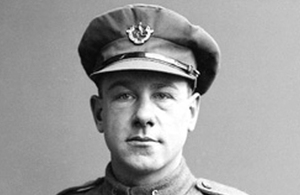WW1 Canadian VC recipient Alexander Picton Brereton
The story of Canadian First World War Victoria Cross recipient Alexander Picton Brereton.

Alexander Picton Brereton [Credit: National Defence Canada]
70 men from Canada received the Victoria Cross, Britain’s highest award for gallantry, during the First World War. As part of the Centenary Commemorations the people of the United Kingdom marked their gratitude to those courageous men by presenting a bronze memorial plaque to their home country engraved with their names. The plaque is now displayed at the British High Commission Ottawa. This archive tells their stories.
Name: Alexander Picton Brereton
DOB: 13 November 1892
Place of Birth: Oak River, Manitoba, Canada
Date of Action: 9 August 1918
Place of Action: near Warvillers, France
Rank: Corporal
Regiment: 8th Battalion, Canadian Expeditionary Force
Alexander Picton Brereton was born on 13 November 1892 in Oak River, Manitoba, Canada. He was working as a barber before enlisting with the 8th Battalion, Canadian Expeditionary Force during the First World War.
Corporal Brereton was awarded the Victoria Cross for his bravery on 9 August 1918 near Warvillers in France. His citation explains:
For most conspicuous bravery during an attack, when a line of hostile machine guns opened fire suddenly on his platoon, which was in an exposed position, and no cover available. This gallant N.C.O. at once appreciated the critical situation and realised that unless something was done at once the platoon would be annihilated. On his own initiative, without a moment’s delay, and alone, he sprang forward and reached one of the hostile machine-gun posts, where he shot the man operating the machine gun and bayoneted the next one who attempted to operate it, whereupon nine others surrendered to him. Cpl. Brereton’s action was a splendid example of resource and bravery, and not only undoubtedly saved many of his comrades’ lives, but also inspired his platoon to charge and capture the fire remaining posts.
Brereton returned to Canada, married and had a family. He died in 1976 in Calgary, Alberta. His Victoria Cross is part of the Lord Ashcroft Gallery at the Imperial War Museum, London.